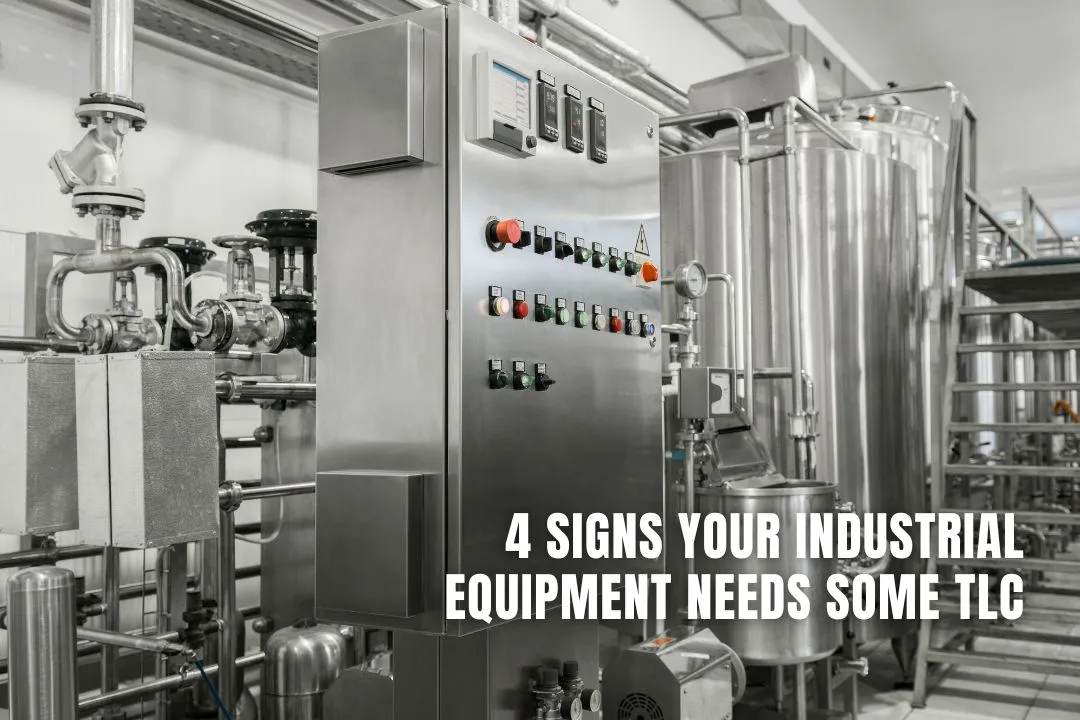4 Signs Your Industrial Equipment Needs Some TLC
July 31, 2025

Running a manufacturing, construction, agriculture, or other type of business that requires industrial machinery? If so, then it’s in your interests to ensure that your all-important equipment is well-maintained and looked after. After all, your heavy-duty machinery plays a vital role in helping to keep your business ticking along and productive, and failure to adequately care for your equipment can result in expensive downtime that can put your business at a competitive disadvantage.
Tackling problems early on is key to preventing such issues. In most cases, industrial machinery will give some warning signs that not all is well under the hood before it experiences more serious, costlier issues. In this post, we’ll run through a few telltale signs that your equipment needs some maintenance.
Key Takeaways on Signs Your Industrial Machinery Needs Maintenance
- Unusual noises indicate hidden problems: Grinding or rattling sounds often signal internal issues that need immediate attention to prevent breakdowns.
- Fuel consumption changes are red flags: Increased diesel usage can point to faulty injectors, cylinder head issues, or improper operating habits.
- Declining performance suggests wear: Slower or inconsistent machinery operation may indicate aging parts or maintenance needs affecting productivity.
- Visual inspections can catch damage early: Cracks, dents, or frayed cables on key components should be addressed to avoid serious malfunctions.
- Proactive checks prevent costly downtime: Tackling small problems early minimizes disruption and saves money compared to full equipment failure.
- Employee vigilance improves safety: Encouraging staff to report unusual behavior or damage helps detect issues before they escalate.
- Routine maintenance extends equipment lifespan: Regular servicing ensures machinery remains reliable, efficient, and safe for long-term use.
- Specialist evaluations ensure accuracy: Professional inspections help diagnose issues correctly and recommend proper fixes or replacements.
Register Your LLC
Company Registration
START NOWStrange Noises
It’s not very scientific, sure, but listening out for strange noises is an easy way to keep tabs on your expensive industrial machinery. Well-functioning equipment should purr, or at least make consistent sounds. Anything that deviates from that noise could be a sign that further investigation is required. A rattling or grinding sound will be an indication that not all is well under the hood.
Burning Through Fuel
It’s always better to take care of any machinery issues before they lead to full-blown failure that brings productivity to a grinding halt. One of the earliest telltale signs, for diesel machinery at least, is if the equipment is burning through more fuel than usual. If you find that you’re filling up the diesel tank with greater frequency, then have your machine looked at. It could be that the Cummins cylinder head needs to be replaced, the fuel injector is faulty, or simply poor operating habits. Whatever it is, it’ll be best to get the issues resolved quickly before it has a chance to impact your operations.
Decreased Performance
Your machinery is there to help you and your employees be as productive as possible, and that can’t happen if the equipment is working less effectively than usual. Machinery that’s slower, less capable, or simply inconsistent is, at best, frustrating to work with, and, at worst, outright dangerous. It could be that the equipment is reaching the end of its lifecycle, but if you think that it should still be fully operational, then get in touch with a specialist.
Obvious Damage/Wear and Tear
Most of the signs that your industrial equipment requires some work relate to paying attention to the sound and feel of the machine. But in some cases, a visual inspection will suffice. While it’s expected that industrial machinery will have a couple of dents and other cosmetic issues, it’s best to take care of major cracks or dents that could impact performance as soon as possible. Pay particular attention to the condition of the materials on the inner parts of the machine, such as any cables or hydraulic systems, which are much more likely to impact performance than the outer shell. Asking your staff to report any issues as early as possible can prevent issues.

